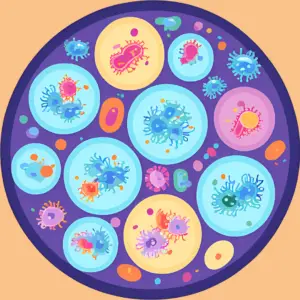Digestion obviously plays a major role in your well-being. Everyone knows one or two instances when your digestion wasn’t working properly and how immediately you start to feel bad. What happens if this becomes a more structural problem? Two of these opportunistic conditions are Small Intestinal Bacterial Overgrowth (SIBO) and Candida overgrowth.
Other than SIBO being bacteria and candida being yeast, they share several characteristics, which is why it’s easy to get confused on what’s going on. Below, I’ll try to explain what the disorders are, when they happen and what you can do about them if you think you might have SIBO and/or candida.
What is SIBO?
First things first, SIBO (Small Intestinal Bacterial Overgrowth), like the name suggests, is a condition that happens when there are too many bacteria in your small intestine. Bacteria aren’t just there to make you sick, we actually work together with them in our digestion.

Like a proper trade deal, they help us digest by fermenting the food in the colon by breaking it down into smaller pieces and this in turn helps them because it’s food.
In our small intestine, on the other hand, we have very few bacteria, because we need to absorb the nutrients there ourselves. So when the bacteria move to the small intestine, they start to eat and break down molecules too soon. it can lead to some uncomfortable consequences, like nutrient malabsorption, gas (that gets stuck), inflammation and other digestive issues.
Unfortunately, SIBO has a long list of potential root causes, making it hard to figure out why the tiny organisms move to the wrong part of your colon. Some of these include: poor gut motility (which is the movement pushing food forward in your bowels), low stomach acid, abdominal surgeries and IBS.

If you are suffering from bloating, diarrhea, constipation, abdominal pain and nutrient deficiencies, you might be suffering from SIBO.
Did you know there are specific types of SIBO? One of them even has foul smelling gas as a symptom. Read more about the types here.
What is Candida Overgrowth?
Candida, or specifically candida albicans, is a type of yeast which naturally lives in your body. It grows everywhere: on your skin, in your digestive tract and even in your genital system.
Usually, candida gives no problems at all, rather, it’s just part of your body’s normal microbiota.
If you have a weakened immune system, you might have gotten candida infections more often. However, these annoying infections, affecting your skin, mouth, intestines or genitals, can happen to truly anyone (6).

The question is: what triggers candida overgrowth? Things like high-sugar diets, frequent antibiotic use, chronic stress, and a weakened immune system can all contribute.
When candida finally sees its chance and takes over, you can dread symptoms like non-stop fatigue, brain fog, skin issues, or recurrent yeast infections and even digestive discomforts too.
Similarities Between SIBO and Candida Overgrowth
Both of these conditions come from the same thing: an imbalance within the gut. Which is often caused when somehow any of the soldiers of your digestive system stop shielding you.
This can have a lot of different reasons, like you using antibiotics, having a weakened immune system due to other diseases or because you’re dieting. Any of these opportunitic organisms, whether yeast or bacteria or something else, see a chance and they take it.
Symptoms
Some of the symptoms for both SIBO and candida overgrowth are sisters in nature, like: bloating, abdominal discomfort, and irregular bowel movements. The conditions also share mental symptoms, like fatigue and brain fog. Both of the conditions can make it harder for your body to absorb nutrients, even if due to different ways. SIBO directly affects absorption in the small intestine.

Candida works less directly, but can disrupt the gut microbiome which can contribute to deficiencies over time. Unsurprisingly, without your body getting proper nutrients, you’ll feel horrible.
This might happen sneakily, I had multiple deficiencies and although I knew I felt bad, I had no idea it could be because I was not getting enough nutrients. After all, I was eating quite healthy.
Shared Risk Factors
So these soldiers shielding you from bad organisms, are easily out-of-whack.
Antibiotics, for example, can disrupt the gut microbiome, giving both bacteria and yeast a chance to overgrow.
Medications can do the same thing, proton pump inhibitors (PPIs), for example, are medications that reduce stomach acid. This might be needed when you’re suffering from chronic acid reflux, stomach ulcers, or H. pylori infections.
Although the medicine works well, stomach acid is also one of the soldiers barricading your body from these trespassers. When acid levels drop, it creates the perfect environment for bacteria and yeast to throw a party in your gut, making overgrowth more likely (4, 5).
The Gut Barrier Connection
Both SIBO and candida have a cause-and-effect connection with the gut barrier.
Your gut lining is the main shield between the inside of your gut and your blood stream. It has a small holes to let exactly the right molecules through, but when these holes get bigger, larger molecules can leak through. Bad actors are usually larger, so lowering this shield, leaves your body vulnerable.

SIBO can cause gut barrier damage over time because the overgrowth of bacteria in the small intestine produces gases and toxins that can inflame the gut lining.
Candida overgrowth is often caused by it because when the gut lining is weakened, it creates an opportunity for candida albicans to overgrow and potentially invade the bloodstream. This leads to issues everywhere in your body rather than just digestion. To add insult to injury, candida produces toxins that can also damage the gut lining. Read more about this chicken-and-egg situation and its tiring symptoms in your whole body, called leaky gut here.
Key Differences Between SIBO and Candida Overgrowth
In short, this is a battle between bacteria and yeast. Although an overgrowth of any of these organisms can greatly impact the gut, there are some differences between SIBO and Candida overgrowth.
Symptoms
If you have SIBO, bloating and discomfort after meals are likely some of your biggest complaints. This happens because the bacteria in your small intestine ferment your food too soon, so the gas they produce after eating stays stuck in the small intestine. The gases themselves cause different issues and it’s the main determinator for which type of SIBO you have. Some give strong diarrhea and others constipation instead.
Since SIBO can interfere with nutrient absorption, you might also notice fatigue, brain fog, or even sugar cravings, as your body struggles to get the energy and nutrients it needs. And the worst part? It often flares up right after you eat, leaving you feeling miserable when you’re just trying to enjoy a meal. I usually already feel it a few minutes after I start eating, causing me to feel full and stop.
Candida overgrowth can cause many of the same symptoms as SIBO, but it often extends beyond digestion.

Bloating and fatigue happen because the yeast releases toxins that can disrupt your gut-brain axis. If you’re dealing with Candida, you might also notice recurring yeast infections, oral thrush (white or yellow tint on the tongue), or skin issues like rashes or fungal infections.
And those intense sugar cravings? They’re often a sign that candida albicans is thriving on sugary foods, making it hard to resist sweet treats.
Causes
SIBO can happen for several reasons, like not enough stomach acid to kill off bacteria before they reach the small intestine.
Another reason may be that small intestine isn’t able to clear bacteria out properly, letting them stick around and multiply. Sometimes this happens because of structural issues in the gut, like surgeries which caused scars or other blockages.
Lastly, if your immune system isn’t working well, it doesn’t matter if this is overall or in the gut specifically. Both of these can make it harder for your body to keep bacteria in check (1).
Candida overgrowth usually happens when the immune system is weakened, for example because of antibiotics, radiotherapy, immunotherapy.
It can also be triggered by damage to the gut’s protective barrier, making it easier for Candida to sneak through and potentially get into your bloodstream, which can lead to serious infections (2).
Also, candida feeds on sugar, so a sugar-rich diet might increase the amount of candida in the body (3).
Diagnosis
SIBO can be tested using a specific non-invasive test called a breath test. After a 12-hour fast, you drink a sugar solution which if you have SIBO, will cause bacteria to produce gases (hydrogen/methane). Then the level of these gases is measured by blowing into a bag every 20 minutes for 3 hours. Find out how the tests work here, it’s quite an easy test. I, myself, thought it wasn’t super pleasant, but the quick and easy results made up for that!
Candida, on the other hand, doesn’t need to be tested using a breath test, but can be figured out via stool test.
Treatment Options for SIBO
SIBO treatment focuses on reducing bacterial overgrowth, managing symptoms, and addressing root causes. Usually, a combination of multiple tactics is needed to ensure that the SIBO is truly gone and stays gone.
- Antibiotics: The most logical place to start to deal with an overgrowth of bacteria is antibiotics. More specifcally, rifaximin is most commonly prescribed to target the overgrowth of harmful bacteria in the small intestine, because it doesn’t target anything before the small intestine.
If you don’t feel comfortable using antibiotics in such a delicate system, I don’t blame you, since it could also be a cause for SIBO. Newer scientific articles are actually testing and finding out that there are natural antibiotics that can be used, which have fewer bad risks. Read more about it here.
- Diet: Certain diets can be helpful to deal with SIBO. An elemental diet starves the bacteria, whereas the low FODMAP diet can be helpful for managing symptoms. Note that these diets should be only be done under guidance of a doctor, because they are quite strict and doing them too long can lead to a shortage of nutrients in your body!
- Lifestyle: Stress management, gut motility support, and intermittent fasting can be used to support the other treatments.
- Gut-Healing Strategies: Certain supplements like glutamine and collagen repair the gut lining, which can then stop candida and bacteria from moving elsewhere in the body through the bloodstream (8).

Treatment Options for Candida Overgrowth
Candida overgrowth treatments aim to restore balance to your gut microbiome and reduce yeast levels.
- Diet: An anti-candida diet eliminates sugars, refined carbs, and yeast-feeding foods, because this is what candida feasts on. Sadly, this includes all sugars and alcohol.
- Antifungal Medication: Prescriptions like fluconazole or natural remedies like caprylic acid.
- Probiotics: Certain beneficial bacteria may help crowd out yeast and that in turn helps promote better gut health.
- Gut-Healing Strategies: Similarly for SIBO, you should focus on a better gut lining to avoid any microorganisms from moving into the bloodstream. You can do this using supplements like glutamine and collagen, which repair the gut lining.
Can SIBO and Candida Overlap?
Unfortunately, yes, you can suffer from both SIBO and candida overgrowth at the same time! And while the symptoms are already quite similar, even more annoyingly, both organisms thrive in the same habitat, like when you have poor gut health or stress.
They can easily happen at exactly same time because both yeast & bacteria are always looking for any opportunity that grows them.
Also, since both of these disorders can damage the protective barrier of the gut, they can jeopardize your health even further. A damaged gut lining causes more candida to grow, after all. So this leads to a vicious circle of growing opportunistic microorganisms.
Thirdly, even while dealing with SIBO, you might make your candida worse. When you use antibiotics to deal with SIBO, you can disrupt the balance of bacteria, making an opening for more candida.

Sadly, it’s quite hard to know whether you have both SIBO and candida overgrowth at the same time, considering the symptoms can be similar. Addressing both conditions often requires a holistic approach, focusing on restoring balance to the gut microbiota while targeting the specific overgrowths and it works best to do this together with a doctor (7).
Are Candida Overgrowth and SIFO the same thing?
Simply said, no, candida overgrowth and SIFO are not the same thing. Small Intestinal Fungal Overgrowth are both ailments related to fungi.
However, SIFO, like the name suggest is specific to the small intestine. It’s a bit like SIBO, but instead of bacteria, it’s fungi choosing the small intestine as their new personal palace. This includes candida, but they can also be other fungi. I have another blog post on SIFO vs. SIBO for more information here.
Candida overgrowth, on the other hand, is not limited to the small intestine and it can happen in any part of your body, like your gut, mouth or even genital area.
So, while Candida Overgrowth can sometimes be part of SIFO if it happens in the small intestine, not every case of Candida Overgrowth is SIFO. It really depends on where it’s happening and what symptoms you’re dealing with!

Conclusion
Candida overgrowth and SIBO are two different conditions that can both, unfortunately, cause painful and annoying symptoms if you have them.
Because it is not only possible to have candida or bacteria overgrowths, but also a combination of the two, it’s best to get tested if you suspect any of them. A doctor can also help you figure out a holistic approach to deal with them.
So you can focus on getting better without making things worse.
Do you suspect you have one of these conditions?
